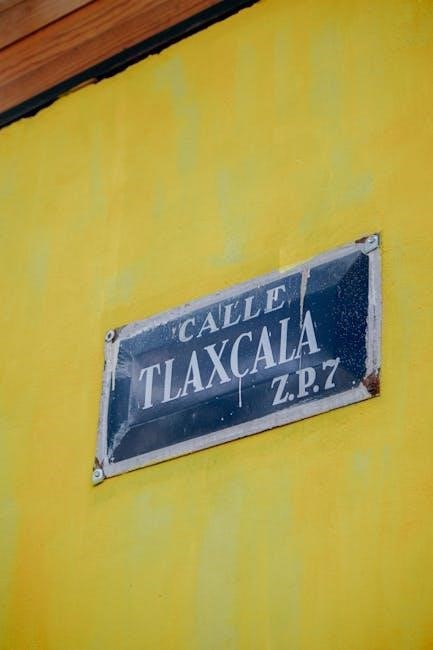Spanish citizenship offers a connection to a rich cultural heritage, with surnames playing a significant role in determining eligibility. The official Spanish citizenship last name list PDF outlines qualifying surnames, simplifying the process for those with Spanish ancestry to claim nationality.

Understanding Citizenship by Descent
Citizenship by descent is a pathway to Spanish nationality for individuals with Spanish ancestors. This form of jus sanguinis (right of blood) allows those with Spanish parents or grandparents to claim citizenship, regardless of birthplace. The process emphasizes ancestral ties, with surnames often serving as indicators of Spanish heritage. While the Spanish citizenship last name list PDF highlights surnames like García, Fernández, and López, it is not the sole determinant of eligibility. Documentation, such as birth and marriage certificates, is required to prove lineage. Recent legal changes have expanded eligibility, particularly for descendants of Spanish women who lost citizenship due to marriage before 1978. This pathway is distinct from naturalization or residency-based citizenship, focusing solely on ancestral connections. It remains a popular option for those seeking to reconnect with their Spanish roots and gain EU citizenship benefits. Proper legal guidance is recommended to navigate the process effectively.
The Role of Surnames in Spanish Citizenship
Surnames play a significant role in determining eligibility for Spanish citizenship, particularly through descent. The Spanish citizenship last name list PDF features surnames like Abad, Abarca, and Zúñiga, which are recognized as having Spanish origins. These names often reflect historical ties to Spain or its former colonies. While the list is not exhaustive, it serves as a guide for individuals researching their ancestry. Surnames can provide crucial evidence of Spanish lineage, especially when combined with documentation such as birth and marriage certificates. However, it is important to note that a surname alone does not guarantee citizenship; it must be supported by a proven family connection to Spain. This approach highlights the cultural and historical significance of surnames in Spanish identity and their practical application in citizenship applications. Understanding the role of surnames can streamline the process for those seeking to claim Spanish nationality through their heritage. Proper research and documentation are essential to ensure eligibility.

The Official Spanish Citizenship Surname List
The Spanish citizenship last name list PDF is a comprehensive resource detailing surnames like Abad, Abarca, and Zúñiga, recognized as having Spanish origins, aiding those pursuing citizenship through descent.
Origin and Criteria for the Surname List
The Spanish citizenship last name list PDF originates from historical records and cultural archives, reflecting surnames tied to Spanish heritage. The criteria for inclusion focus on surnames with clear Spanish origins, such as those appearing in ancient documents or linked to specific regions like Old Castile, Aragon, or Catalonia. Surnames are selected based on their linguistic roots, historical prevalence, and geographic distribution within Spain; Many listed surnames, such as Abad, Abarca, and Zúñiga, trace back to medieval times and are associated with noble or common families. The list also includes surnames of Sephardic Jewish origin, acknowledging Spain’s diverse historical identity. While having a surname on the list is a strong indicator of eligibility, it is not the sole requirement for citizenship, as applicants must also provide genealogical proof. The criteria ensure a balance between cultural heritage and legal standards for nationality claims.

How to Access the Official Surname List PDF
To access the official Spanish citizenship surname list PDF, visit the Spanish government’s official websites, such as the Boletín Oficial del Estado (BOE), Ministry of Justice ([www.mjusticia.gob.es](http://www.mjusticia.gob.es)), or Ministry of Foreign Affairs ([www.exteriores.gob.es](http://www.exteriores.gob.es)). Navigate to sections related to citizenship or nationality to find downloadable resources. Additionally, check regional government or embassy websites for localized information. For further assistance, contact the Spanish Civil Registry or relevant departments directly. Ensure to verify the credibility of non-governmental sources before using them for official purposes.
Myth vs. Reality: Surname-Based Citizenship Claims
While the Spanish citizenship last name list PDF includes surnames of Spanish origin, it is a common misconception that having one of these names automatically grants citizenship. In reality, citizenship is not solely determined by a surname but requires documented proof of ancestry, such as birth and marriage certificates linking the applicant to a Spanish citizen. Additionally, the list is often misunderstood; it includes names of historical Sephardic Jewish origin, as Spain has made amends for past injustices, allowing descendants of expelled Jews to apply. Many surnames on the list are common in Latin America and other regions with Spanish influence, but eligibility still depends on direct lineage. Thus, while the surname list is a helpful resource, it is not the sole determinant of citizenship eligibility.
Application Process for Spanish Citizenship
The process involves submitting required documents like birth and marriage certificates, proving ancestry or residency. It is streamlined for those with Spanish heritage, ensuring efficient eligibility verification.
Required Documents for Citizenship by Descent
To apply for Spanish citizenship by descent, specific documents are essential to prove eligibility. These include a valid passport, birth certificate, and marriage or death certificates of ancestors. Applicants must provide certified translations of these documents, along with proof of Spanish heritage. If claiming Sephardic Jewish descent, additional evidence like heritage certificates or historical records may be required. The process also involves legal authentication of documents, such as apostilles, to ensure their validity. Gathering these documents is a critical step in demonstrating a direct link to Spanish ancestry. The Spanish government requires meticulous documentation to verify lineage and ensure compliance with citizenship laws. Proper preparation of these documents streamlines the application process and avoids delays. Consulting with legal experts can help navigate the complexities of document collection and authentication.
Step-by-Step Guide to Applying for Citizenship
Applying for Spanish citizenship involves a structured process to ensure eligibility and compliance with legal requirements. First, determine your eligibility through ancestry or residency. Next, gather all required documents, including birth, marriage, and death certificates, as well as proof of Spanish heritage. Legalize these documents with apostilles and certified translations if necessary. Submit your application through the Spanish Civil Registry or consulate, depending on your location; Attend an interview or exam to demonstrate knowledge of Spanish culture and language. Pay the applicable fees and await processing. Once approved, take the oath of allegiance and receive your citizenship certificate. The process can be complex, so consulting with legal experts is highly recommended to avoid delays. Proper preparation and adherence to deadlines ensure a smooth journey to obtaining Spanish nationality.
Processing Times and Costs Associated with Citizenship
Processing times for Spanish citizenship applications vary, typically ranging from 12 to 24 months, depending on the complexity of the case and the workload of the authorities. Factors such as the accuracy of submitted documents and the need for additional verification can influence delays. Costs include application fees, which are generally around €100 for citizenship by descent, and additional expenses for document legalization, translations, and notary services. Optional legal assistance may add to the total cost. Payments are typically made in Euros and must be completed at specific stages of the process. It’s important to budget for potential travel to Spain or visits to consulates, which can increase overall expenses. Applicants should check the latest fee structures and processing timelines on official Spanish government websites or through legal advisors to ensure accurate planning and compliance with requirements.

Special Cases and Additional Considerations

Special cases include citizenship for Sephardic Jews and descendants of Spanish women who lost nationality due to marriage before 1978. Recent legal changes expand eligibility for certain groups, simplifying pathways to citizenship.
Citizenship for Sephardic Jews and Their Descendants
Spain has extended citizenship to Sephardic Jews and their descendants as a historic gesture of reconciliation. In 2015, a law was enacted allowing individuals of Sephardic origin to acquire Spanish nationality without residency requirements. This pathway honors the expulsion of Sephardic Jews in 1492 and acknowledges their enduring connection to Spanish culture. To qualify, applicants must demonstrate Sephardic heritage through documentation, such as birth and marriage certificates, as well as proof of cultural or linguistic ties to Spain. Additionally, applicants may provide evidence of Sephardic surnames recognized in official lists or connections to Jewish communities with historical links to Spain. This law offers a unique opportunity for descendants of Sephardic Jews to reclaim their Spanish roots and obtain citizenship, reflecting Spain’s commitment to repairing its historical past. Applications are still being accepted, making it a significant pathway for those seeking Spanish nationality.
Recent Changes in Spanish Citizenship Laws
Recent updates to Spanish citizenship laws have expanded eligibility for individuals claiming nationality through ancestry. In 2015, Spain introduced legislation allowing descendants of Sephardic Jews to acquire citizenship, acknowledging their historical ties to Spain. This law was further expanded in 2022, eliminating the previous requirement to reside in Spain for a year before applying. Additionally, amendments in 2023 addressed cases of citizenship lost by Spanish women who married non-Spanish citizens before the 1978 Constitution, allowing their grandchildren to reclaim Spanish nationality. While the Spanish citizenship last name list PDF provides guidance on qualifying surnames, it is not the sole determinant of eligibility. These changes reflect Spain’s efforts to reconnect with its diaspora and rectify historical injustices. The revised laws aim to streamline the application process and ensure that individuals with legitimate claims can obtain citizenship more efficiently.
Maintaining Dual Citizenship

Spanish law permits dual citizenship, allowing individuals to retain their original nationality while acquiring Spanish citizenship. This provides a unique opportunity to maintain cultural ties and access benefits from both countries. Dual citizenship requires adhering to the responsibilities of both nationalities, including tax obligations and legal requirements. For many, it represents a proud connection to their heritage while offering convenience for travel and residency within the European Union.
Rights and Responsibilities of Dual Citizens
Dual citizenship under Spanish law grants individuals the right to maintain their original nationality while enjoying the benefits of Spanish citizenship. Dual citizens can freely travel, live, and work within the European Union, benefiting from the rights associated with EU membership. They also have the right to vote in Spanish and European elections, participate in cultural activities, and access public services. However, dual citizens must fulfill the responsibilities of both nationalities, including adhering to tax obligations, military service requirements, and legal duties in both countries. It is essential to understand and comply with the laws of both nations to avoid complications. While the Spanish citizenship last name list PDF may simplify the eligibility process, dual citizenship requires careful management of rights and responsibilities to ensure seamless integration into both cultures and legal systems.












































